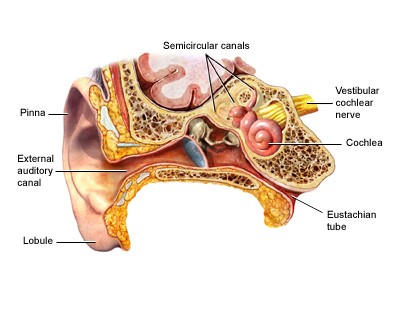Acoustic neuroma
An acoustic neuroma is a slow-growing tumor of the nerve that connects the ear to the brain. This nerve is called the vestibular cochlear nerve. It is behind the ear right under the brain. An acoustic neuroma is not cancerous (benign). This means that it does not spread to other parts of the body. However, it can damage several important nerves as it grows.
Causes
Acoustic neuromas have been linked with the genetic disorder neurofibromatosis type 2(NF2). Acoustic neuromas are uncommon.

Symptoms
The symptoms vary based on the size and location of the tumor. Because the tumor grows so slowly, symptoms most often start after age 30.
Common symptoms include:
- Abnormal feeling of movement (vertigo)
- Hearing loss in the affected ear that makes it hard to hear conversations
- Ringing (tinnitus) in the affected ear
Less common symptoms include:
- Difficulty understanding speech
- Dizziness
- Headache
- Loss of balance
- Numbness in the face or one ear
- Pain in the face or one ear
- Weakness of the face
Exams and Tests
The health care provider may suspect an acoustic neuroma based on your medical history, an exam of your nervous system, or tests.Often, the physical exam is normal when the tumor is diagnosed. Sometimes, the following signs may be present:
- Decreased feeling on one side of the face
- Drooping on one side of the face
- Unsteady walk
The most useful test to identify an acoustic neuroma is an MRI of the brain. Other tests to diagnose the tumor and tell it apart from other causes of dizziness or vertigo include:
- Hearing test (audiology)
- Test of equilibrium and balance (electronystagmography)
- Test of hearing and brainstem function (brainstem auditory evoked response)
Treatment
Treatment depends on the size and location of the tumor, your age, and your overall health. You and your health care provider must decide whether to watch the tumor (observation), use radiation to stop it from growing, or try to remove it.
Many acoustic neuromas are small and grow very slowly. Small tumors with few or no symptoms may be watched for changes, especially in older patients. Regular MRI scans will be done.
If they are not treated, some acoustic neuromas can damage the nerves involved in hearing and balance. They can also affect the nerves responsible for movement and feeling in the face. Very large tumors can lead to a buildup of fluid (hydrocephalus) in the brain, which can be life threatening.
Removing an acoustic neuroma is more commonly done for:
- Larger tumors
- Tumors that are causing symptoms
- Tumors that are growing quickly
- Tumors that are pressing on the brain
Surgery is done to remove the tumor and prevent other nerve damage. Any hearing that is left is often lost with surgery.
Stereotactic radiosurgery focuses high-powered x-rays on a small area. It is considered to be a form of radiation therapy, not a surgical procedure. It may be used:
- To slow down or stop the growth of tumors that are hard to remove with surgery
- To treat patients who are unable to have surgery, such as the elderly or people who are very sick
Removing an acoustic neuroma can damage nerves, which may cause loss of hearing or weakness in the face muscles. This damage is more likely to occur when the tumor is large.
Outlook (Prognosis)
An acoustic neuroma is not cancer. The tumor does not spread (metastasize) to other parts of the body. However, it may continue to grow and press on structures in the skull. People with small, slow-growing tumors may not need treatment. Once hearing loss occurs, it does not return after surgery or radiosurgery.
Possible Complications
- Brain surgery can completely remove the tumor in most cases.
- Most people with small tumors will have no permanent paralysis of the face after surgery. However, about two-thirds of people with large tumors will have some permanent weakness of the face after surgery.
- About one-half of patients with small tumors may still be able to hear in the affected ear after surgery.
- There may be delayed radiation effects after radiosurgery, including nerve damage, loss of hearing, and paralysis of the face.
When to Contact a Medical Professional
Call your health care provider if you have:
- Hearing loss that is new or getting worse
- Ringing in one ear
- Dizziness (vertigo)
Alternative Names
Vestibular schwannoma; Tumor - acoustic; Cerebellopontine angle tumor; Angle tumor
Source: http://www.nlm.nih.gov/medlineplus/ency/article/000778.htm

